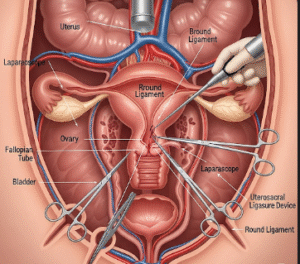Overview
Pain relief after surgery is an essential component of post-operative care that ensures comfort, faster recovery, and reduced complications. Proper pain management can improve mobility, prevent chronic pain development, and enhance overall patient satisfaction.
South Korea is known for advanced post-operative pain management protocols, expert anesthesiologists, and comprehensive rehabilitation programs, making it a top destination for patients seeking optimal recovery after surgery.
What is Pain Relief After Surgery?
Pain relief after surgery involves medications, interventions, and supportive measures to control post-operative pain. Key features include:
✔ Pharmacologic interventions: Analgesics such as opioids, NSAIDs, acetaminophen, and local anesthetics.
➔ Non-pharmacologic methods: Ice, heat, positioning, and physical therapy.
● Regional anesthesia: Epidurals, nerve blocks, or local infiltration to reduce pain at the surgical site.
★ Multimodal approach: Combining different methods for effective pain control and minimized side effects.
Proper post-operative pain relief reduces stress, promotes healing, and prevents complications such as deep vein thrombosis or pulmonary issues.
What are the Benefits?
Effective post-operative pain relief offers multiple advantages:
✔ Reduces patient discomfort and stress.
➔ Promotes faster recovery by enabling early mobility and physiotherapy.
● Prevents chronic post-surgical pain by controlling acute pain effectively.
★ Minimizes complications such as high blood pressure, tachycardia, or respiratory problems.
➤ Improves patient satisfaction and overall outcomes.
Procedure Details
1) How should I prepare for Pain Relief After Surgery?
Preparation ensures effective pain management:
✔ Pre-operative assessment: Discuss your pain tolerance, history of chronic pain, allergies, and previous reactions to pain medications.
➔ Medication review: Inform your doctor about current medications, supplements, and anticoagulants.
● Pain management plan: Develop a tailored strategy based on surgery type and patient health.
★ Patient counseling: Discuss expectations, potential side effects, and non-pharmacologic strategies.
➤ Lifestyle optimization: Adequate rest, hydration, and nutrition before surgery can improve pain control outcomes.
2) What happens during the procedure Pain Relief After Surgery?
Pain relief is administered before, during, and after surgery:
✔ Pre-emptive analgesia: Pain medications given before surgery to reduce post-operative pain.
➔ Intraoperative interventions: Regional anesthesia, nerve blocks, or local anesthetic infiltration at the surgical site.
● Multimodal analgesia: Combining opioids, NSAIDs, and acetaminophen for optimal effect.
★ Monitoring: Continuous assessment of vital signs and pain levels during and immediately after surgery.
➤ Immediate post-operative care: Pain controlled in recovery room using IV or oral medications as needed.
Korean hospitals use advanced monitoring systems and individualized protocols to ensure safe and effective pain relief.
3) What happens after Pain Relief After Surgery?
Post-operative pain management focuses on comfort, healing, and mobility:
✔ Regular assessment: Pain scores monitored frequently to adjust medication as needed.
➔ Oral medications: Transition from IV to oral analgesics when patient tolerates oral intake.
● Non-pharmacologic support: Ice packs, heat therapy, relaxation techniques, and physical therapy.
★ Patient education: Instructions on medication timing, dosage, and side effects.
➤ Follow-up: Ensure continued pain control and address any complications at outpatient visits.
Risks / Benefits
Possible Risks:
✔ Medication side effects: nausea, drowsiness, constipation (opioids)
➔ Allergic reactions or drug interactions
● Local anesthesia-related complications (temporary numbness, rare nerve injury)
★ Over- or under-treatment of pain, leading to discomfort or side effects
➤ Dependency risk with prolonged opioid use
Major Benefits:
✔ Effective pain relief and patient comfort
➔ Faster mobilization and recovery
● Reduced risk of chronic post-surgical pain
★ Minimized complications related to immobility
➤ Improved overall surgical outcomes and patient satisfaction
Recovery and Outlook
✔ Immediate recovery: Pain levels gradually decrease as anesthesia wears off.
➔ Short-term management: Pain controlled with medications and supportive measures for the first few days to weeks depending on surgery type.
● Long-term outcome: Multimodal pain management reduces risk of chronic pain and improves rehabilitation success.
★ Lifestyle integration: Adequate rest, nutrition, and gentle activity aid healing.
➤ Follow-up: Regular assessments ensure pain is managed effectively, and any complications addressed promptly.
When To Call the Doctor
Contact your doctor immediately if you notice:
✔ Severe or uncontrolled pain despite medications
➔ Allergic reactions to pain medications
● Signs of infection at surgical site (redness, swelling, pus)
★ Numbness, weakness, or loss of function related to nerve blocks
➤ Persistent vomiting, severe constipation, or other medication side effects
Best Korea Option / Process
South Korea provides expert post-operative pain relief with:
✔ Leading hospitals: Samsung Medical Center, Asan Medical Center, Seoul National University Hospital.
➔ Advanced pain management protocols: Multimodal and personalized approaches.
● Specialist anesthesiologists and pain management teams: Skilled in acute and post-surgical pain control.
★ Comprehensive care: Includes medications, regional anesthesia, and non-pharmacologic therapies.
➤ Medical tourism support: Translation, travel coordination, and continuity of care for international patients.
✅ Highlights:
✔ Pain relief after surgery is essential for comfort, recovery, and complication prevention
➔ Multimodal approach combines medications and non-pharmacologic methods
● Minimally invasive regional anesthesia options reduce systemic side effects
★ Risks include medication side effects, nerve-related issues, or inadequate pain control
➤ Korean hospitals provide advanced protocols, expert teams, and comprehensive follow-up care












